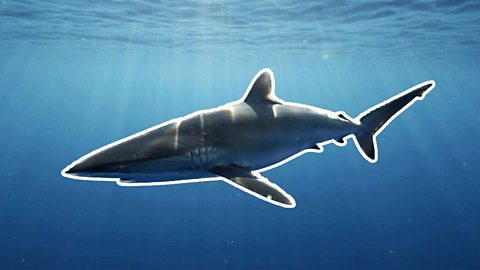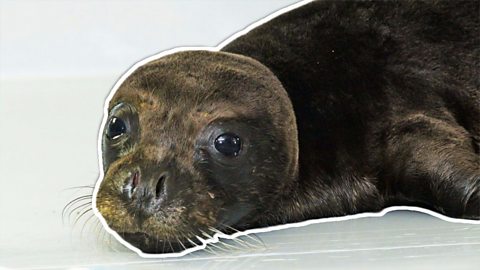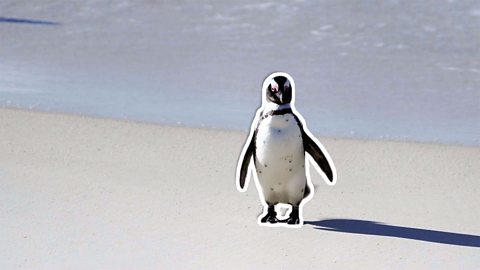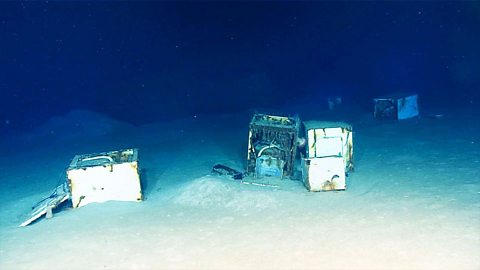NARRATOR:'On the island of Eleuthera in the eastern Bahamas, biologist Owen O'Shea, from The Centre for Ocean Research and Education, is on a mission to protect the local stingrays.'
OWEN O'SHEA:Move it into the shallows.
NARRATOR:'This quiet part of the Bahamas is becoming a popular holiday destination which is creating pressure on the island and waters around it.'
OWEN O'SHEA:'Stingrays have a significant value to the environment.' We know that, in the Bahamas particularly, 'rays equal a healthy ecosystem.'
NARRATOR:'If the stingray population is doing well, it's a sign the waters they live in are doing well too. But if they're not, it can spell trouble. Owen's been monitoring the rays here for the past six years. If he finds evidence that tourism is affecting how they use these waters, he can build a case to protect them. To do that, he has to tag the rays.'
NARRATOR:'But stingrays have a very sharp barb at the end of their tails which they use to defend themselves. So catching them is a difficult task. So he's recruited a team of young Bahamians to help him. This is Christina and Enrique's first time ray catching.'
OWEN O'SHEA:Alright, so guys, you see these rays here, right? There's a big one and a small one. They're being really chill, so we can try and get these ones. Okay, go, go.
NARRATOR:'The team need to catch the rays in their net.'
OWEN O'SHEA:You want to run up this way. Don't worry about that, go for the middle one.
NARRATOR:'But catching a fish that can swim as fast as an Olympic swimmer is easier said than done.'
OWEN O'SHEA:Veejay, get up there, alright? Cut it off.
UNKNOWN MALE:Coming your way, Brandon.
NARRATOR:'This is an adult southern stingray.'
OWEN O'SHEA:So this is a male. Anecdotally, we find that males tend to be a little bit feistier.
NARRATOR:'Before the team can do anything, they must protect themselves from its sting.'
OWEN O'SHEA:I see the barb, so that's what we're trying to avoid. Enrique, wrap it round the barb as neat as possible. Okay, hold its tail for me, right there on the barb. Okay, you're going to turn with me.
NARRATOR:'With the barb safely held, they take vital measurements to help understand the health of these fish.'
OWEN O'SHEA:Yeah, 65.
UNKNOWN MALE:65.
OWEN O'SHEA:Okay, you can see its nares, or its nostrils, just above its nose. A lot of people think it's like a smiley face, but that's actually a very sophisticated sense detection, it's like our nostrils. And then these are its claspers, this is how we can tell that itŌĆÖs a male. So now we've just got to tag him.
NARRATOR:'By tagging the rays, Owen can track their movements. This builds a picture of how they use the waters around the island, crucial to understanding how best to protect them as tourism brings more people here.'
OWEN O'SHEA:So the animal's now ready for release. Pull the net out the water.
NARRATOR:'The information Owen is gathering is important, but he also needs to pass on his passion and skills about stingrays to the younger generation.'
MALE IN WHITE TOP:Since I've started working with Owen I actually want to pursue being a fisheries biologist. I want to be that guy that makes the laws to protect fish.
NARRATOR:'One day these young marine biologists may be the ones making important decisions'
OWEN O'SHEA:Already we've had interns that started off with us when they were in school that are now working for NGOs, that are now thinking about university. 'So 10 years from now, maybe we'll have people in government.'
NARRATOR:'In the meantime, Owen's research is providing a vital insight into the lives of the rays here, key to protecting them in the future.'
Video summary
Biologist Dr. Owen OŌĆÖShea, principal research scientist of The Centre for Ocean Research and Education in the Bahamas, has devoted his life to stingrays.
He is now teaching young Bahamians how to protect the rays on the island of Eleuthera.
This clip is from the 91╚╚▒¼ series, Blue Planet Live. Below are a few ideas to get you started with your class.
Teacher Notes
What makes stingrays special?
The stingrays are adapted to their environment.
The learners should be able to describe what the structure of the stingray is and how this is similar to and different from other species which live in the same habitat.
Pupils could make model stingrays using paper and identify the structure of it.
They can discuss what the barb is for and how this defends the stingray.
They can then identify other animals that have adaptations for defending themselves against predators or threats.
Can you be a Biologist?
The learners should be told about the study of living things.
They can become a biologist for a day and identify an endangered animal that they would like to find out more about.
They should find out some facts about the animals and share these to develop written and/or verbal skills.
Stingrays as an indicator species?
The stingray numbers will go down if the ocean is not as healthy.
The learners should be able to discuss and identify reasons why tourism will possibly make the ocean less healthy.
The link between tourism and the impact on the environment can be explored and the learners can articulate why changes in the habitats mean living things are threatened.
What would you research as a scientist?
The scientist in the video is trying to find out lots of information about the Stingrays to help protect them.
The learners can identify an aspect in science they would research and what they hope it would do.
They could write a job description for their role or describe their latest findings.
Why do we need to protect species?
The learners are removed from stingrays so asking them to think about the impact of the species declining is a good challenge.
They can apply their learning about habitats and food chains to a less familiar context. The need to protect endangered species is a good context for the learners discussing the changes humans are making on the world and how plants and animals are adapted to specific environments.
The ŌĆśBigŌĆÖ Questions (with opportunities for extended writing and discussion)
Are we right to protect animals that are endangered?
Should tourism be stopped in areas where there are endangered species?
Suitable for teaching Science at KS2 in England, Wales and Northern Ireland and 2nd level in Scotland.
The effects of industrial fishing on Silky Sharks. video
A look at the migration of an endangered species of shark known as the silky shark.

Protecting the Mediterranean Monk Seal. video
Scientists in Greece are working to protect the rare Mediterranean Monk Seal.

The declining food supplies for South African penguins. video
Scientists have come up with an unusual plan to help South African penguins.

Trashing the deep. video
Marine Biologist, Diva Amon investigates how we are affecting the deep sea.

╠²
╠²